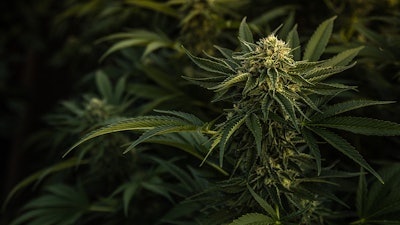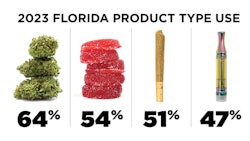
It’s been another hectic year for the cannabis industry, from the U.S. Department of Health and Human Services’ (HHS) recommendation that cannabis be rescheduled to the evolution of cannabis banking reform to Ohio voters approving an adult-use legalization measure in the November election.
With so many potential policy changes on the horizon, which ones should business operators be most attentive to?
Here, Jonathan Robbins, chair of Akerman’s cannabis practice, outlines the legislation and potential policy changes to watch in 2024.
1. SAFER Banking Act
The Secure and Fair Enforcement (SAFE) Banking Act—which aims to provide safe harbor for banks, credit unions, and other financial institutions and payment processors that provide services to state-licensed cannabis businesses and has passed the U.S. House seven times since 2019—got a makeover this year when lawmakers revealed a revised version of the legislation in September, ahead of a scheduled committee markup.
The Senate Banking Committee approved the amended bill—called the Secure and Fair Enforcement Regulation (SAFER) Banking Act of 2023 (S. 2860)—during a markup hearing Sept. 27. While it remains to be seen when and if the legislation is considered on the Senate floor, Senate Majority Leader Chuck Schumer, D-N.Y., has vowed to call a vote on the SAFER Banking Act “as quickly as possible.”
While the industry has been buzzing about the banking reform legislation for the past several years, Robbins predicts that Congress will have more pressing issues to deal with next year, pushing SAFER Banking to the back burner once again.
“I do not feel optimistic that we are going to finally see the passage of the SAFER Banking Act in 2024,” he says. “I don't think we’re going to end up seeing it pass this year, even though I’d have probably been more optimistic and hopeful than ever if you’d asked me that question back in September.”
What could help the legislation’s chances, Robbins says, is if lawmakers amended the bill to include language that would allow cannabis businesses to access U.S. public exchanges.
“I’m really tired of seeing U.S. plant-touching companies that want to do a public offering having to do so on a Canadian exchange,” he says. “And I know that U.S. regulators would like to do it, but they’re afraid to do it. I’ve had those conversations, and so I would love to see some policy reform in that respect. And while it's not necessarily part of the SAFER Act, I would be hopeful that the passage of that act, if it ever happens, would open the door to U.S. exchanges being a little more welcoming of the industry.”
2. Rescheduling
Part of the reason Robbins believes that the SAFER Banking Act will stall again in 2024 has to do with the HHS’ August recommendation that cannabis be reclassified under the Controlled Substances Act (CSA). HHS still has not confirmed publicly the details of its recommendation, but Bloomberg, which first broke the news, said they viewed an unredacted letter sent to the Drug Enforcement Administration (DEA) that indicated HHS officials suggested a move to Schedule III. The DEA must now decide whether it will accept or reject that recommendation.
“I think that it’s probably more likely that just leading up to the election, we’re going to see some movement on the issue of rescheduling cannabis from a Schedule I controlled substance to a Schedule III substance,” he says. “The buzz in the industry is let’s deal with that and then the financial issues will sort of fall into line behind it.”
Robbins would prefer cannabis to be descheduled rather than rescheduled; he says rescheduling could be a death sentence to small businesses if they are required to undergo clinical trials through the U.S. Food and Drug Administration (FDA) and the additional regulatory scrutiny that comes along with producing and selling a Schedule III controlled substance.
“People have a lot of guesses and speculation as to what the practical effects are going to be to the industry [in terms] of rescheduling,” Robbins says. “It seems to me that [Schedule II] is really off the table and now, based upon the HSS recommendation that it be moved to Schedule III, that would be the most likely candidate, which is great and applauded in the industry [because it would remove 280E]. But what is that going to mean if you are a small cultivator in Oregon or a retailer in California?”
2024 is an election year, and Robbins expects some movement on rescheduling before voters head to the polls in November.
“President Biden is going to want to have some nugget to be able to dangle in front of the voters come November, so I think that he’s going to probably push the DEA to consider and reschedule cannabis to Schedule III under the CSA before the election,” he says.
3. Federal Legalization Bills
While federal officials evaluate how cannabis is scheduled under the CSA, Congress has several cannabis legalization bills to consider.
Rep. Jerry Nadler, D-N.Y., reintroduced the Marijuana Opportunity, Reinvestment and Expungement (MORE) Act (H.R. 5601) in September. The legislation would deschedule and decriminalize cannabis at the federal level, as well as provide expungements for certain cannabis offenses and create reinvestment opportunities for those adversely impacted by prohibition. Previous versions of the MORE Act have passed the U.S. House twice.
Rep. Nancy Mace, R-S.C., filed the States Reform Act of 2023 (H.R. 6028) last month, building off the States Reform Act that the congresswoman filed in November 2021 alongside four Republican co-sponsors. The latest version of the bill aims to “amend the Controlled Substances Act regarding marihuana, and for other purposes,” as Cannabis Business Times previously reported.
In early December, another federal cannabis reform bill entered the ring in Washington when Rep. Dave Joyce, R-Ohio, reintroduced the latest version of the Strengthening the Tenth Amendment Through Entrusting States (STATES) Act. That bill aims to ensure that each U.S. state has the right to determine the best approach to cannabis legalization within its borders.
Overall, Robbins doubts any of these federal policy reform efforts will make much progress next year as lawmakers focus on more pressing issues, both domestic and abroad.
“There are so many issues in an election year that people are going to focus on,” he says. “Unfortunately, cannabis reform or even reform with respect to psychedelic substances is not going to be a priority, but we can walk and chew gum at the same time, so there’s certainly no reason why this can’t be addressed as well.”
4. Florida’s Adult-Use Ballot Measure
At the state level, Robbins says 2023 was a good year for adult-use legalization, with Delaware, Minnesota and Ohio joining the ranks of the 21 adult-use states that came before them. 2024 will be a big year for these states as they roll out commercial adult-use sales, and Robbins also expects more states to legalize, including Pennsylvania, South Dakota, Hawaii and, perhaps most notably, Florida.
“Mostly I’m keeping my eyes on Florida because I am a Florida resident and a Florida attorney, and we have been heavily involved in the efforts to make Florida an adult-use state,” he says. “Unfortunately, that’s something that Florida’s Legislature has not only been slow to move on, but they’ve been very active in trying to prohibit any steps towards adult use in the state of Florida. However, I feel pretty good it’s going to happen.”
Smart and Safe Florida has sponsored an adult-use legalization measure that the group hopes to get on the November 2024 ballot. The proposal has faced criticism from Florida Attorney General Ashley Moody and now awaits a decision from the state Supreme Court on whether it is fit to appear on next year’s ballot.
RELATED: Florida Supreme Court Schedules Oral Arguments for 2024 Cannabis Ballot Measure
In 2021, the Florida Supreme Court stopped a pair of legalization attempts from appearing on the state’s 2022 ballot, ruling that the language was misleading to voters.
“They’ve pushed back hard, and our governor, [Ron] DeSantis, has been pretty public about his opposition to adult-use legalization in Florida, but the sponsors of the bill have put a lot of time and effort and money into it, and they’ve spent a lot of time crafting the language in the proposed legislation,” Robbins says. “In my personal view, I think that the language is not misleading at all, and I don’t think it violates the single subject rule. And we were up in November before the Supreme Court of Florida, and I’m hopeful and optimistic that the Supreme Court will agree with us in the matter, we’ll make the ballot in November, and if it makes the ballot, I’m very optimistic that it’ll pass, and that’ll be a big boom for the state of Florida. Hopefully it will result in a lot of tourism dollars and tax dollars to the state.”
5. The Farm Bill
The 2023 Farm Bill is another hot topic in the cannabis industry heading into 2024. The legislation is expected to miss an end-of-year deadline and be kicked to next year, and Robbins hopes the end result will tie up loose ends regarding delta-8 THC and other intoxicating hemp-derived cannabinoids that were not addressed in the 2018 Farm Bill that federally legalized hemp.
Robbins says the current patchwork of state regulations on these cannabinoids “wreaks havoc on the industry” and could be addressed through cohesive federal legislation like the Farm Bill.
RELATED: Industry Associations Weigh In on 2023 Farm Bill: What’s to Come for Hemp?
“There’s been a lot of debate and a lot of disagreement in the industry over other cannabinoids besides delta-9 THC in the plant and whether they should be legal and should be commercialized or not,” he says. “I’m curious to see how the 2023 Farm Bill that will be released in 2024 is going to address that and close those loopholes, if at all.”


























